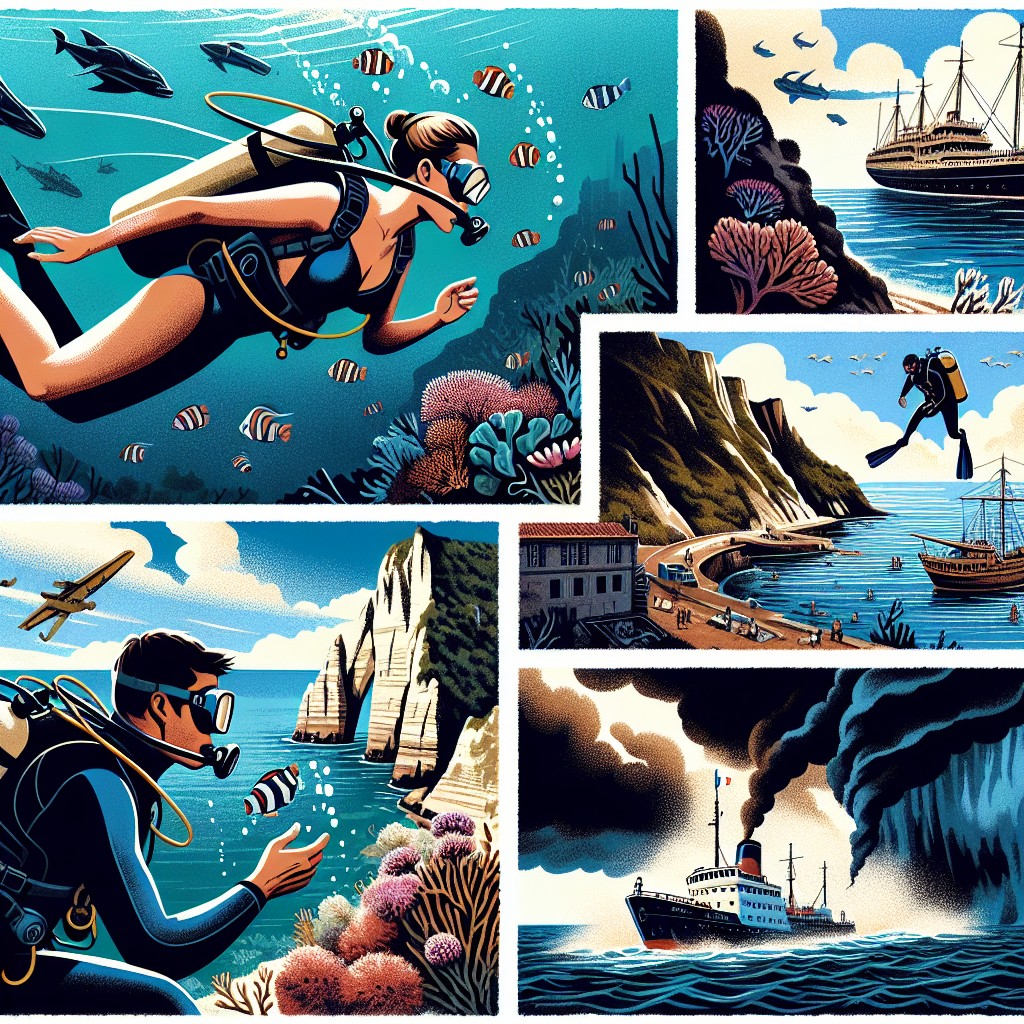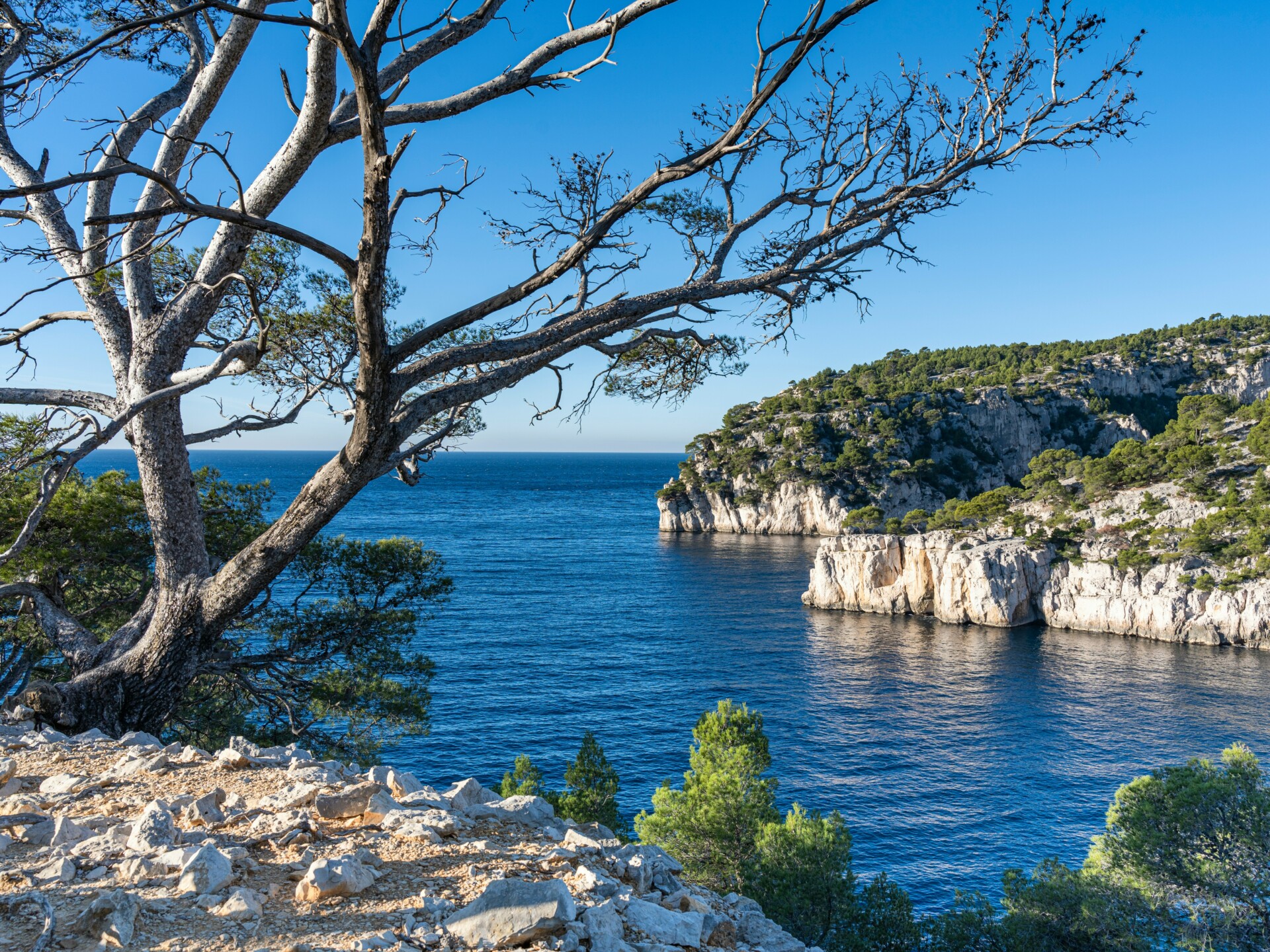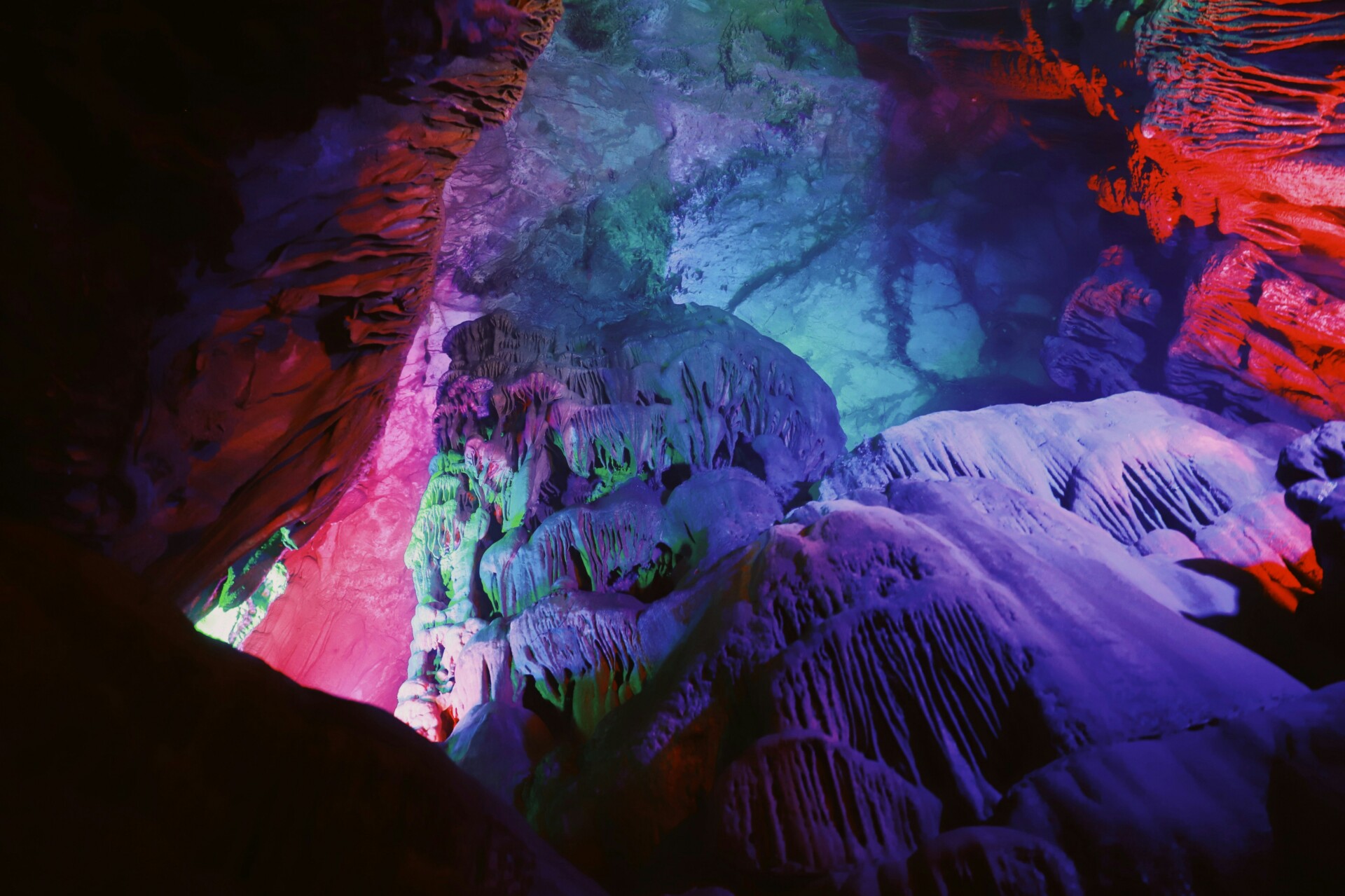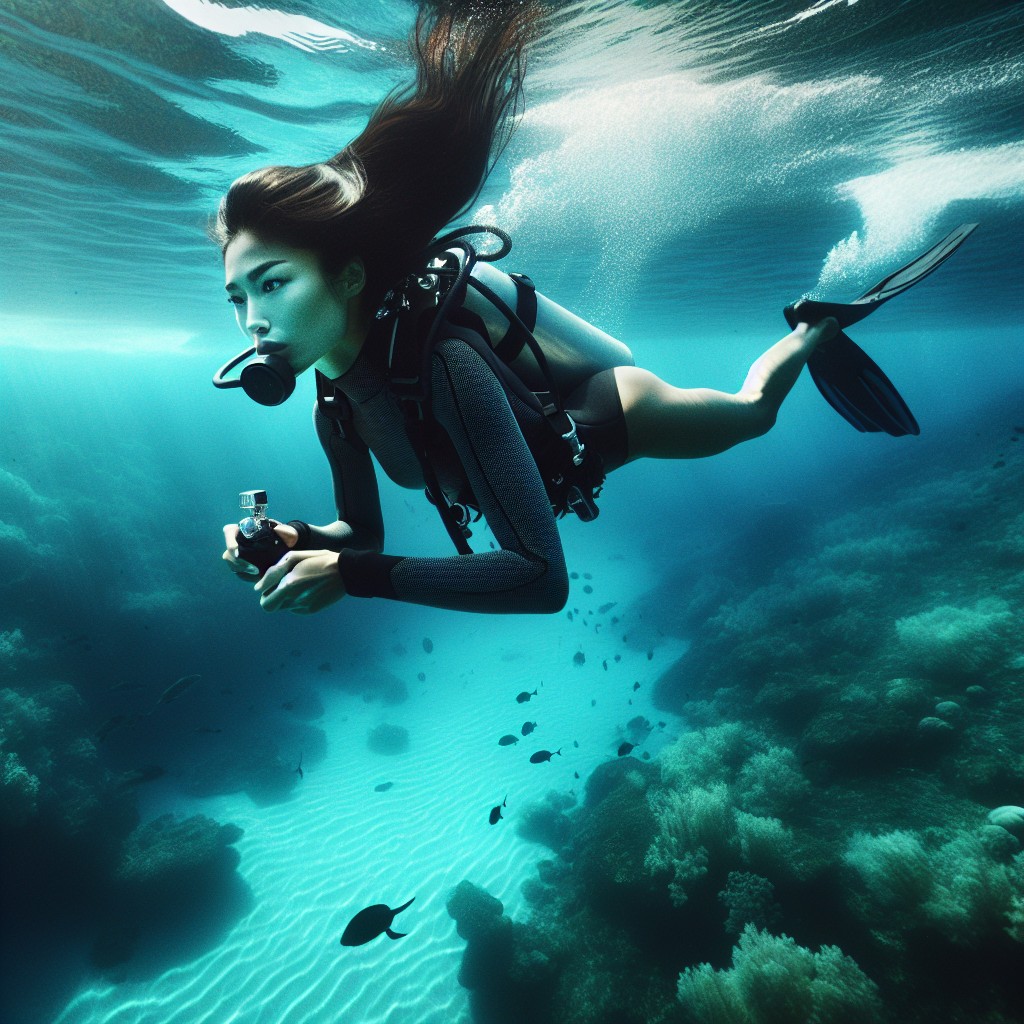Diving in France
France boasts a wide array of diving adventures, accommodating divers of all levels. With the Mediterranean Sea, the English Channel, and the North Sea, each region offers distinct underwater experiences, from wreck diving to vibrant marine life. Understanding the various dive locations is crucial for planning an unforgettable diving holiday.
Overview of Dive Locations
In France, divers can explore numerous unique environments characterized by cool waters, gentle waves, and breathtaking underwater landscapes. The diving conditions are diverse, offering opportunities for various levels of expertise.
| Diving Region | Key Features | Visibility (m) |
|---|---|---|
| Mediterranean Sea | Warm waters, coral reefs, rich biodiversity | 15 – 30 |
| Normandy | Historical wrecks, cool waters | 5 – 15 |
| Corsica | Clear waters, stunning visibility | Up to 30 |
| Guadeloupe | Diverse underwater sceneries, lush reefs | 10 – 25 |
Popular Dive Spots
Several dive spots stand out in France, each known for their unique attractions and diving conditions. For those seeking adventure, here are some of the most popular areas to explore:
-
Corsica: Known for its crystal-clear waters and visibility reaching up to 30 meters, Corsica is a top destination for divers looking for serene underwater environments.
-
Normandy: This region is ideal for historical diving, particularly wreck diving enthusiasts. It provides a glimpse into history, with numerous shipwrecks to explore, making it a must-visit for any serious diver (Source).
-
Guadeloupe: This Caribbean gem offers a plethora of underwater attractions, including coral reefs, underwater caves, and shipwrecks. Diverse substrates allow divers to discover meadows, drop-offs, and arches, making it one of the most exciting areas for diving in France (Source).
-
Cannes: The Iles de Lerins area, particularly known for its rich marine biodiversity, is a popular diving spot. Its protected waters are home to various marine species, offering a vibrant underwater experience (Source).
For divers planning their next adventure, understanding these diving conditions in France is essential. More information on specialized diving options, such as wreck diving in France and cave diving in France, can help tailor your diving experience to your interests. Additionally, exploring diving packages in France can provide convenient options for planning diving trips.
Diving in Corsica
Clear Waters and Visibility
Corsica is renowned as a premier diving destination in France, celebrated for its exceptionally clear waters. Divers can experience visibility of up to 30 meters, making it an ideal environment for underwater exploration (Source). This clarity allows divers to fully appreciate the vibrant marine life and stunning underwater landscapes that Corsica has to offer.
| Visibility Range | Depth (Meters) | Description |
|---|---|---|
| 20 – 30 meters | Shallow to moderate depth | Ideal for general diving experiences |
| 10 – 15 meters | Deeper waters | Suitable for exploring wrecks and marine parks |
Such visibility ensures that deep dives remain accessible and enjoyable for divers of all skill levels. As a bonus, the warm waters of the Mediterranean add to the overall appeal of diving in Corsica.
Dive Experiences
Corsica offers diverse dive experiences that cater to various preferences. The region boasts a blend of underwater caves, vibrant reefs, and historical wreck sites which provide unique adventures for scuba divers.
-
Underwater Caves: For those interested in technical diving, Corsica features impressive cave systems that present thrilling opportunities for exploration. Divers can navigate through crystal-clear waters while admiring stunning geological formations. Explore more about cave diving in France for detailed information on the best locations.
-
Marine Reserves and Parks: Sites like the Port-Cros National Marine Park, located on the Côte d’Azur, highlight the rich biodiversity that can also be explored from Corsica. The park is home to abundant marine life, including bream, eels, and groupers, making it a perfect spot for sport divers looking to encounter various species amidst colourful flora (The Culture Trip).
-
Historical Wrecks: Corsica is not without its historical allure, featuring significant wreck diving opportunities. One notable site is the wreck of the mine-launcher submarine ‘The Rubis’ off the coast of St Tropez at Cap Camarat. Divers are drawn to explore the remnants of this WWII submarine, learning its history while navigating where torpedoes were once launched.
Each of these experiences highlights the diverse diving conditions in France that make Corsica a must-visit for scuba divers planning their next holiday in France. Whether exploring a serene reef or tracing the ruins of a historical vessel, Corsica promises memorable diving adventures. Consider looking into diving packages in France to find the right options for your next diving expedition.
Normandy Wreck Diving
Normandy is renowned for its rich history and is a prime location for wreck diving enthusiasts. The area offers access to numerous historical wrecks, providing divers with a unique opportunity to explore sunken ships and learn about their stories.
Historical Wreck Diving
Wreck diving in Normandy is not just about the adventure; it also serves as a glimpse into maritime history. The region is home to various wrecks, including those from both World Wars. These sites are often well-preserved, allowing divers to witness and reflect on the impact of history beneath the waves. Normandy is highly recommended for those who take an interest in historical wreck diving, making it a must-visit destination for scuba divers (Source).
Key Wreck Sites
Below are some of the key wreck sites divers can explore in Normandy, each offering a unique experience:
| Wreck Name | Type | Depth (m) | Year Sank | Highlights |
|---|---|---|---|---|
| Swansea Vale | British Freighter | 20 | 1918 | Notable for its large cargo holds |
| Émile Banning | WWII Merchant Ship | 35 | 1944 | Engine and hull well-preserved |
| HMT Hoolette | Royal Navy Minesweeper | 30 | 1944 | Fascinating structure and history |
| USS Samuel Chase | WWII Troop Transport | 50 | 1944 | Large wreck suitable for advanced divers |
Brest, located in the region, also offers a mixed diving experience, combining shipwrecks with natural escarpments. Sites like Sec de Bertheaume consist of a wall dive that reaches depths of around 20 meters (Dive Buddies 4 Life).
While planning for wreck diving adventures in Normandy, it remains crucial for divers to be aware of local regulations. It is mandatory for divers to present their diving certification, proof of dive insurance, a logbook, and a doctor’s note verifying fitness to dive (Dive Buddies 4 Life).
For divers interested in expanding their skills in wreck diving, exploring advanced diving in France can provide further insight and training opportunities. Additional resources, including various diving packages in France, can help streamline planning for this exciting dive holiday in Normandy.
Guadeloupe Underwater
Guadeloupe stands out as a premier diving destination in France, offering an array of unique underwater experiences. With its rich biodiversity and varied substrates, it is an ideal choice for divers looking for adventure in an exquisite natural setting.
Diverse Underwater Sceneries
The underwater environments of Guadeloupe are characterised by their impressive diversity. Divers can explore meadows, coral reefs, wrecks, arches, caves, and dramatic drop-offs. This variety makes Guadeloupe an exciting location for both novice and experienced divers alike. Each type of underwater terrain offers a different set of biological communities and ecosystems to discover.
| Underwater Scenery | Description |
|---|---|
| Coral Reefs | Vibrant ecosystems teeming with marine life. |
| Wrecks | Explore historical sites that have become artificial reefs. |
| Caves | Unique formations that provide thrilling exploration opportunities. |
| Arches | Stunning geological structures to swim through and around. |
| Drop-offs | Vertical walls rich in diverse marine life. |
For those interested in the specific experiences available, Guadeloupe’s reefs are home to a plethora of fish species and coral types, creating vivid underwater landscapes that are a diver’s dream.
Exciting Dive Locations
Guadeloupe hosts several notable dive sites that highlight its underwater beauty. Each location presents a unique diving condition in France, offering something for everyone:
-
Pigeon Island:
Known for its crystal-clear waters and abundant marine life, this site is ideal for snorkelers and divers. It features coral reefs where divers can see a variety of colourful fish and marine species. -
Cousteau Reserve:
This protected area is home to numerous dive sites, including stunning coral formations and marine biodiversity. It’s perfect for those looking to experience the underwater wonders while minimising their ecological impact. -
Grand-Cul-de-Sac Marin:
This lagoon offers various points of interest, from mangroves to seagrass beds. Its calm waters make it a suitable dive site for beginners and experienced divers alike. -
The Wreck of the Agulhas:
An intriguing dive site for wreck enthusiasts, where divers can explore the remnants of this sunken vessel, which has become a habitat for many marine organisms.
The diversity of dive sites makes Guadeloupe an essential stop for anyone interested in scuba diving in France. Those planning their next dive holiday can look forward to thrilling underwater adventures while experiencing the rich marine ecosystems that this Caribbean paradise has to offer. For more dive packages and tailored experiences, visit our page on diving packages in France.
Cannes Marine Life
Cannes, particularly the marine protected area of Iles de Lerins, is renowned for its rich marine biodiversity, making it an attractive destination for divers seeking vibrant underwater experiences. With clear waters and a diverse array of marine life, it offers a unique and rewarding diving adventure.
Rich Marine Biodiversity
The waters surrounding Cannes teem with life. Divers can expect to encounter various species, ranging from colourful fish to the more elusive marine creatures. The thriving ecosystem includes popular sightings such as:
| Marine Species | Description |
|---|---|
| Groupers | Large, robust fish found in rocky areas. |
| Seabreams | Commonly seen near reefs, known for their silver scales. |
| Sea Anemones | Vibrant, flowing creatures nestled within the rocks. |
| Starfish | Often spotted on the seabed, adding colour to the underwater landscape. |
Additionally, the Iles de Lerins area hosts numerous diving spots with varying depths, allowing divers at different skill levels to explore the stunning underwater environment safely. The conditions in this region generally offer excellent visibility, often reaching between 30 to 40 meters (98.4 to 131.2 feet) (Source).
Iles de Lerins Area
The Iles de Lerins is an archipelago situated just off the coast of Cannes, comprising two main islands: Île Sainte-Marguerite and Île Saint-Honorat. Both islands are surrounded by crystal clear waters, making them ideal for both diving and snorkelling. The area’s protected status helps maintain its natural beauty and diversity, providing a safe haven for numerous marine species.
Divers can explore various locations around the islands, such as:
- Les Moines: Known for its underwater archaeological sites, including remnants of ancient shipwrecks.
- Batterie du Lion: A historical site featuring underwater ruins and vibrant marine life.
- Île Sainte-Marguerite Coves: A series of beautiful coves that are perfect for exploring both underwater flora and fauna.
For those seeking guided experiences, various diving packages in France are available, catering specifically to divers who wish to explore the wealth of marine life in this region. These offerings often include equipment rental, instruction, and opportunities to learn about the local ecosystem.
Whether diving for pleasure or to observe marine biodiversity up close, Cannes and the Iles de Lerins provide a stunning backdrop for unforgettable underwater adventures. Divers should also remember to respect local regulations to ensure the preservation of this natural treasure. For further exploration in diving opportunities, consider wreck diving in France or advanced diving in France to expand your underwater experience.
Scuba Diving Essentials in France
Understanding the essentials of scuba diving in France is crucial for ensuring a safe and enjoyable diving experience. This section outlines the seasonal considerations divers should take into account and the necessary rules and regulations to follow.
Seasonal Considerations
The diving season in France varies by region. For example, in Brittany, particularly in Brest, the peak season for diving is during the summer months from May to October. Most dive shops remain open daily during this time, offering numerous diving opportunities. Conversely, diving activities significantly slow down during the winter months (Dive Buddies 4 Life).
When planning a dive trip, divers should also consider the water temperature, which can affect the choice of wetsuit. A general guide for wetsuit thickness is provided in the table below:
| Water Temperature | Recommended Wetsuit Thickness |
|---|---|
| 15°C – 18°C | 5mm wetsuit |
| 18°C – 20°C | 4/3mm wetsuit |
| 20°C – 24°C | 3mm wetsuit |
| Above 24°C | 2mm or shorty wetsuit |
Rules and Regulations
France has specific regulations that scuba divers must adhere to, especially in popular diving areas like Brest. Divers are required to present the following documentation before participating in any diving activities:
- Dive certification
- Dive insurance
- A logbook detailing previous dives
- A doctor’s note dated within the last year, confirming fitness to dive
These requirements are strictly enforced by dive shops and clubs to mitigate liability in case of incidents.
Additionally, diving in Brest typically costs between 80€ to 100€, which includes boat transport, two dives, tanks, and weights. Equipment rental can vary, with prices ranging from 5€ per item to 15€ for a complete set. Diving with a local club often offers a more affordable and community-oriented experience.
For those interested in exploring various diving options, including specialized activities like wreck diving in France or advanced diving in France, it is advisable to check with local dive shops regarding specific regulations and unique dive packages available in each region.



